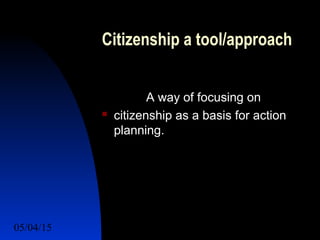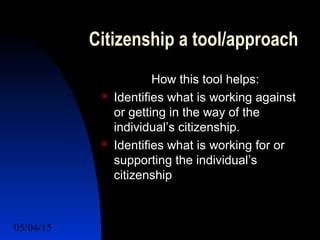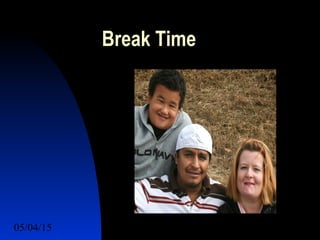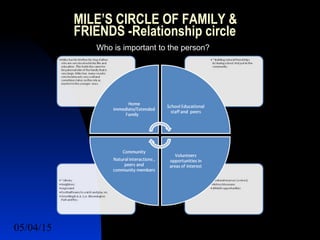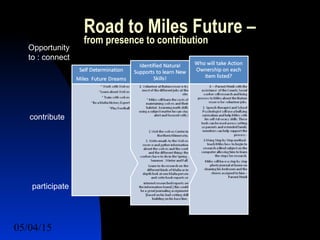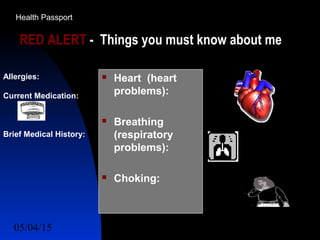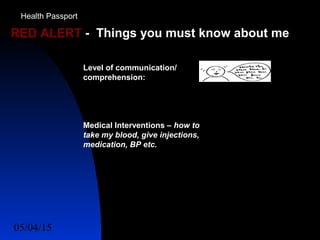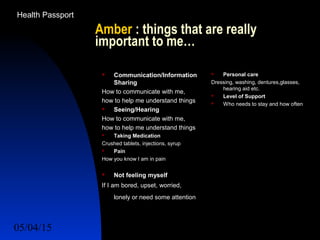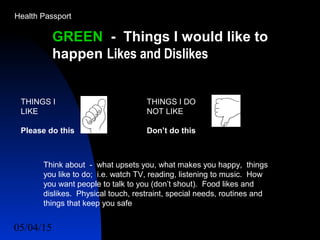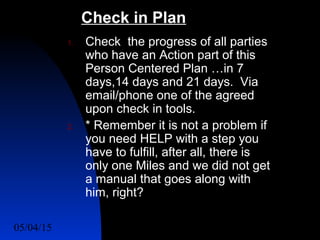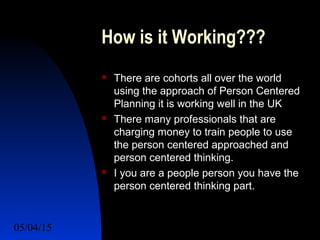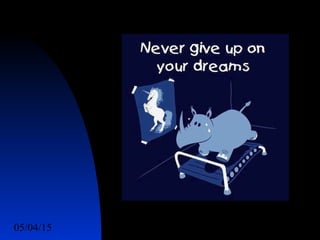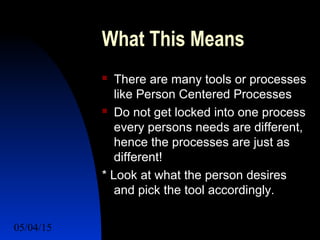The document provides an overview of person-centered planning from its origins to current practices. It traces the development of person-centered planning from principles of normalization and social role valorization in the 1960s-1970s. Key figures who developed these concepts include Bengt Nirje, Wolf Wolfensberger, and Robert Perske. The document also discusses the early implementation of person-centered practices by organizations like ENCOR in the 1970s. Today, person-centered planning is used to facilitate individualized transition planning for students with disabilities. An example plan is provided for a 13-year-old boy. The plan identifies the student's strengths and needs, support network, and goals for independence, contribution, and community participation.
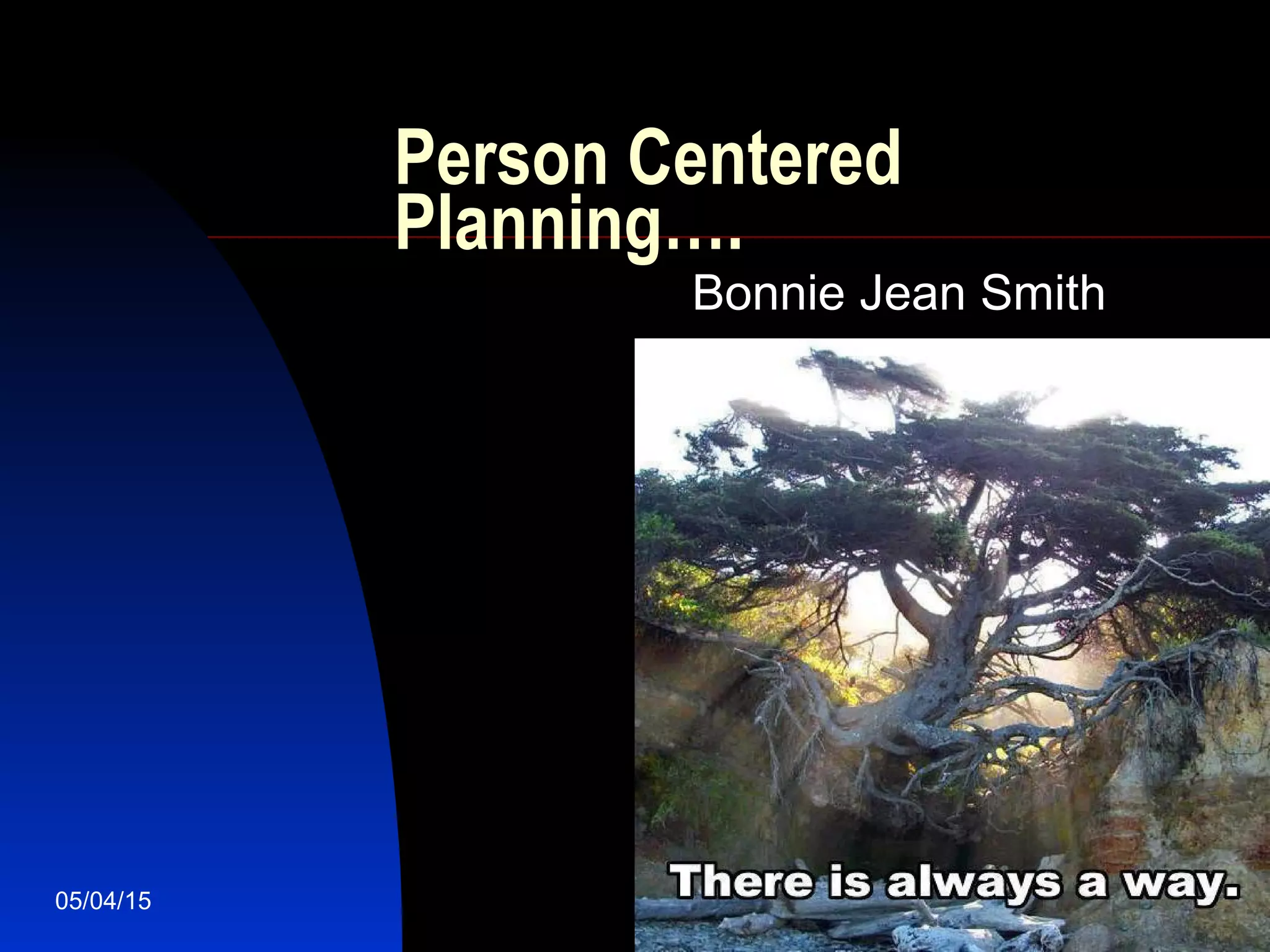
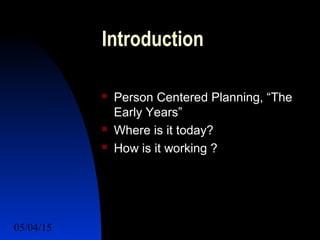
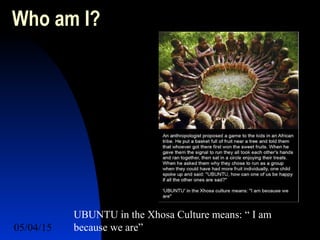
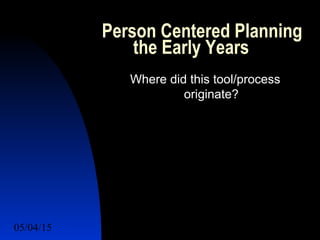
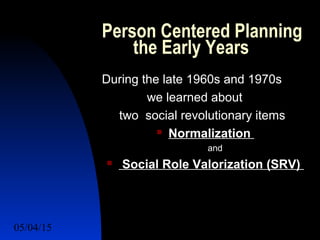
![05/04/15 6
Bengt Neirje 1924-2006
The Father of Normalization
Bengt Nirje, Secretary General of the Swedish National
Association for Mentally Retarded – [Intellectually
Disabled], as saying:
"The key is trying to achieve the same good standard
of life for people with developmental disabilities as we
want for people who live in the general society. Our
aim is to create the conditions of life as similar or the
same as for the rest of the population. You have to do
it for human dignity and human decency."
Bengt gave a simple solution to finding out what the
young adults with developmental disabilities wanted in
life……………..“Ask Them!”
http://www.mnddc.org/parallels2/one/018.htm](https://image.slidesharecdn.com/e66a4771-a247-4f38-9795-df5b056f8bf6-150504114004-conversion-gate01/85/Person-Centered-Planning-march-6-320.jpg)
![05/04/15 7
Normalization
“The normalization principle
means making available to all
people with disabilities people
patterns of life and conditions of
everyday living which are as close
as possible to the regular
circumstances and ways of life or
society.”[1]
( The Principle of Normalization: www.mnddc.org}](https://image.slidesharecdn.com/e66a4771-a247-4f38-9795-df5b056f8bf6-150504114004-conversion-gate01/85/Person-Centered-Planning-march-7-320.jpg)
![05/04/15 8
“…including the normal rhythm of a
day, a week, a year, and the life-
cycle itself. It involves the normal
conditions of life – housing,
schooling, employment, exercise,
recreation and freedom of choice.
This includes “the dignity of risk”,
rather than an emphasis on
“protection”.[2]
Normalization, Social Role Valorization (SRV)
and the approach of Person Centered Planning
(PCP)](https://image.slidesharecdn.com/e66a4771-a247-4f38-9795-df5b056f8bf6-150504114004-conversion-gate01/85/Person-Centered-Planning-march-8-320.jpg)
![05/04/15 9
Bengt Nirje, Robert Perske,
Wolf Wolfensberger, G. Allan Roehrer
Photos courtesy William Bronston, M.D.
President's Committee on Mental Retardation –
[Intellectual Disabilities] (PCMR)), recognized
that the Principle of Normalization emerged in
the 1960s as the most important concept shaping
the future of residential services. At the time, is
was defined as "making available to the Mentally
Retarded – [Intellectually Disabled] patterns and
conditions of everyday life which are as close as
possible to the norms and patterns of the
mainstream of society… it essentially refers to
approaching the retarded as much as possible as
if they were normal." (ILSMH, 1969).
[http://www.mnddc.org/parallels2/one/010.htm]](https://image.slidesharecdn.com/e66a4771-a247-4f38-9795-df5b056f8bf6-150504114004-conversion-gate01/85/Person-Centered-Planning-march-9-320.jpg)
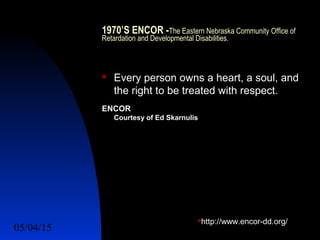
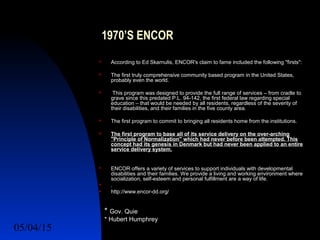
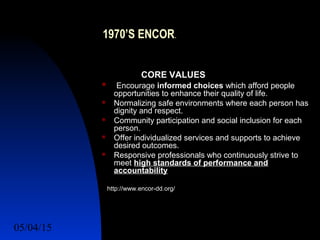
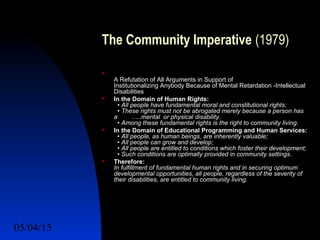
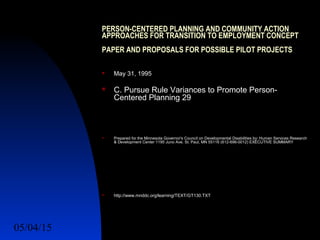
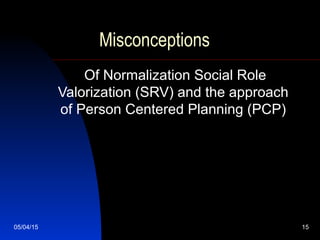
![05/04/15 16
Misconceptions
a) Normalization means making people “normal”
– forcing them to conform to societal norms.
b) Of Normalization, Social Role Valorization
(SRV) and the approach
of Person Centered Planning (PCP) means
planning for an individual based on your own life
experiences and desires.
~~~remember~~~
"The founding of the institutions was accompanied
by a pride, hope, and euphoria we can scarcely
comprehend."
– Wolf Wolfensberger [http://www.mnddc.org/parallels/four/4b/1.html 2013]](https://image.slidesharecdn.com/e66a4771-a247-4f38-9795-df5b056f8bf6-150504114004-conversion-gate01/85/Person-Centered-Planning-march-16-320.jpg)
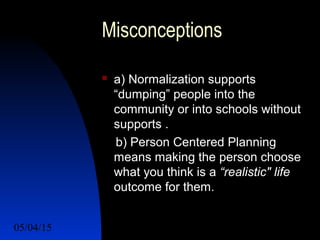
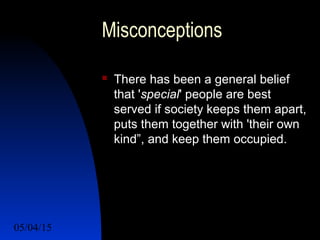
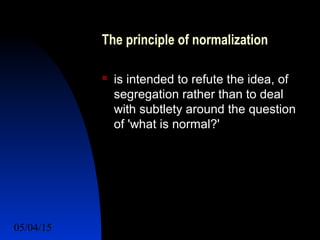
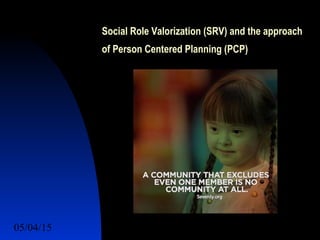
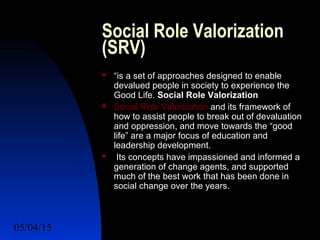
![05/04/15 22
Social Role Valorization (SRV) and the approach
of Person Centered Planning (PCP)
These approaches are best used
by persons who clearly believe that
devaluation of a person is wrong,
and who are prepared to work to
overcome this.
meet people where they are at
.”[http://www.socialrolevalorization.com/ -Wolf
Wolfensburger”]](https://image.slidesharecdn.com/e66a4771-a247-4f38-9795-df5b056f8bf6-150504114004-conversion-gate01/85/Person-Centered-Planning-march-22-320.jpg)
![05/04/15 23
Social Role Valorization (SRV) and the approach
of Person Centered Planning (PCP)
SRV's many strategies, derived from
practical experience and from what
research has revealed, is to help
devalued people achieve valued social
roles.
It finds that this is the most powerful way
to work against devaluation and its
negative effects, and provides a wide
variety of techniques and approaches for
doing so
.”[http://www.socialrolevalorization.com/ -Wolf
Wolfensburger”]](https://image.slidesharecdn.com/e66a4771-a247-4f38-9795-df5b056f8bf6-150504114004-conversion-gate01/85/Person-Centered-Planning-march-23-320.jpg)
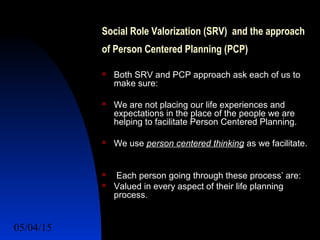
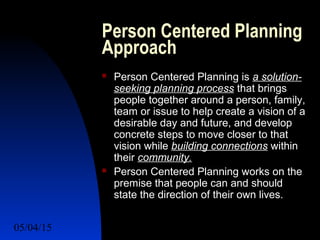
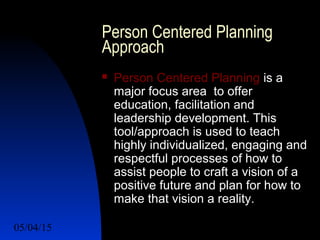
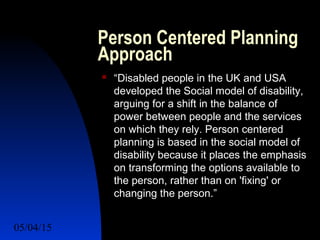
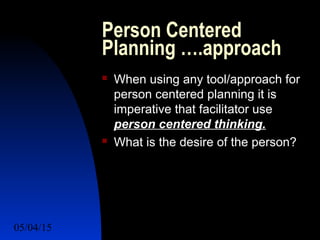
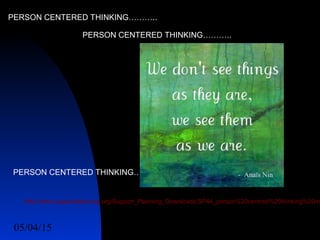
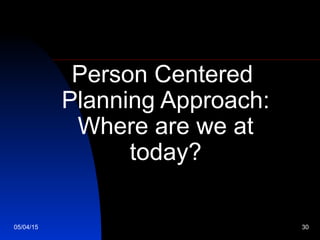
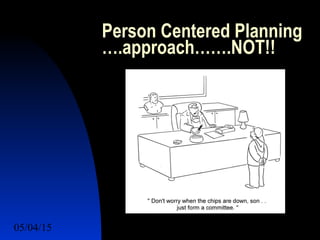
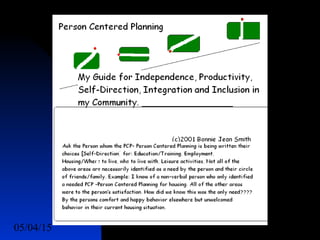
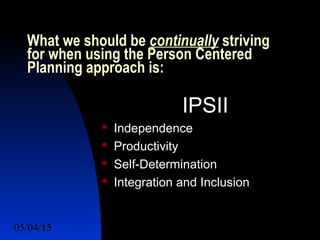
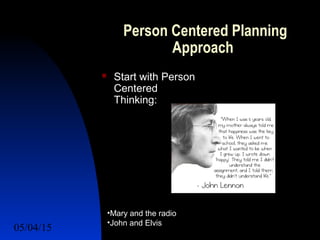
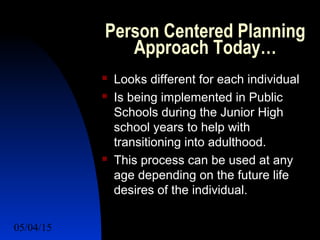
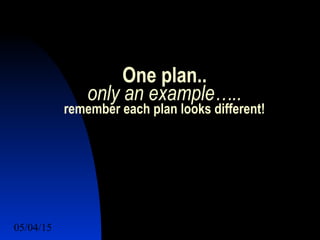
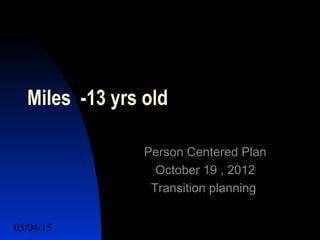
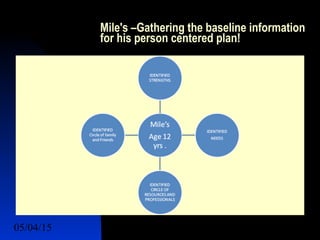
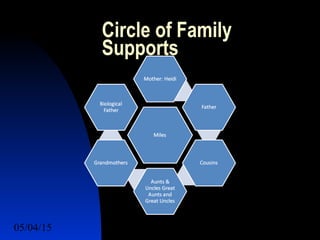
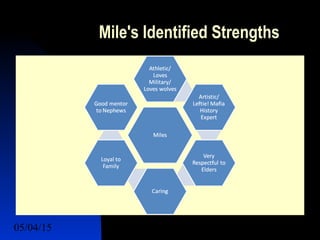
![05/04/15 41
Identified Opportunities For
Improvement [ofi’s] or Identified
Needs](https://image.slidesharecdn.com/e66a4771-a247-4f38-9795-df5b056f8bf6-150504114004-conversion-gate01/85/Person-Centered-Planning-march-41-320.jpg)
![05/04/15 42
Identified Opportunities For
Improvement [ofi’s] or
Identified Needs
Depression- suicidal
Repeating aggressive bulling acts that
were perpetrated towards him.](https://image.slidesharecdn.com/e66a4771-a247-4f38-9795-df5b056f8bf6-150504114004-conversion-gate01/85/Person-Centered-Planning-march-42-320.jpg)
